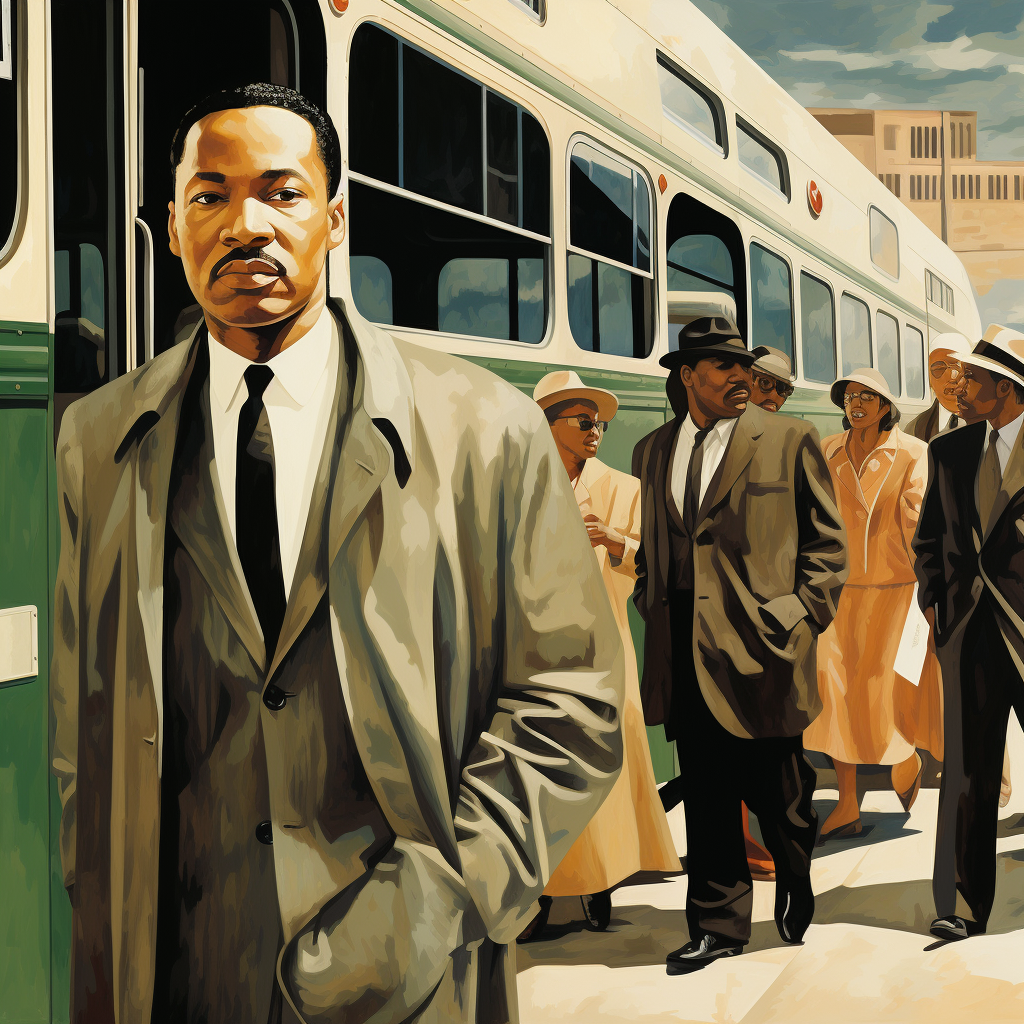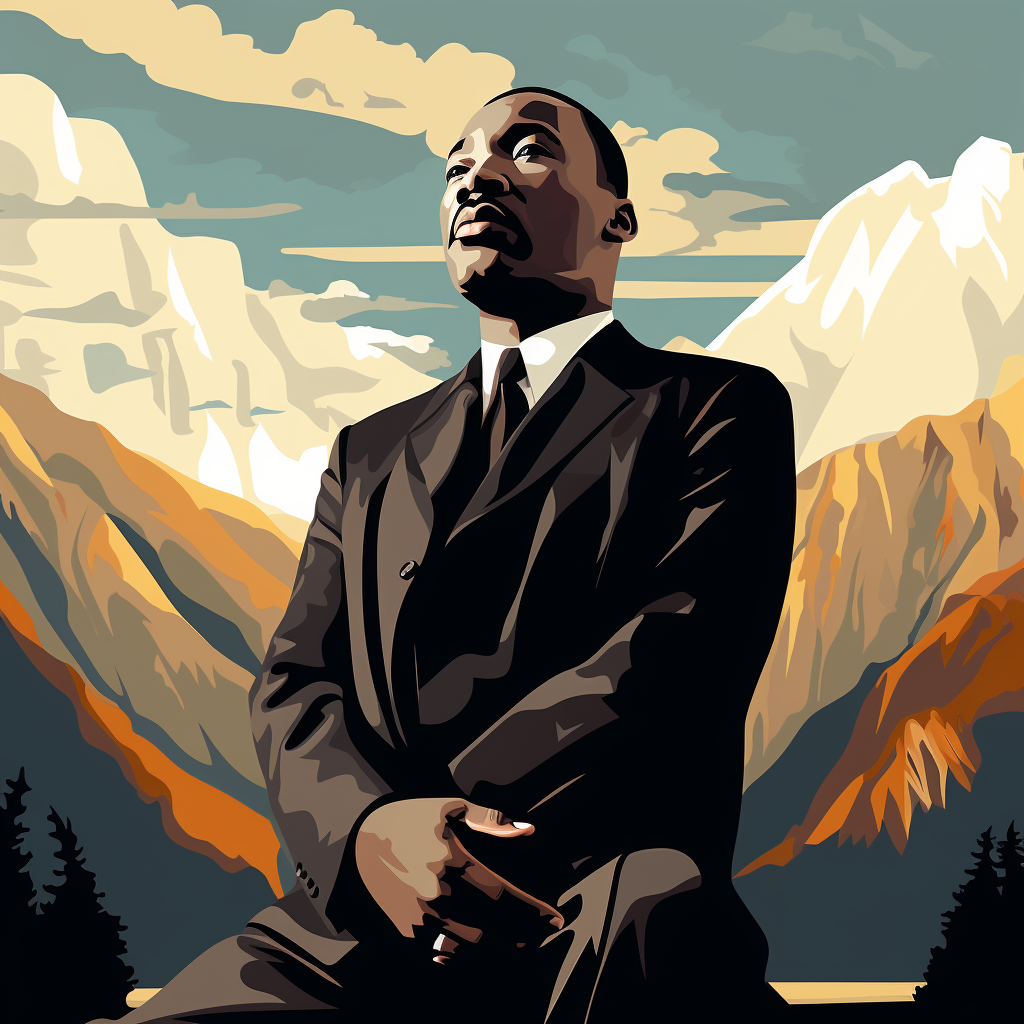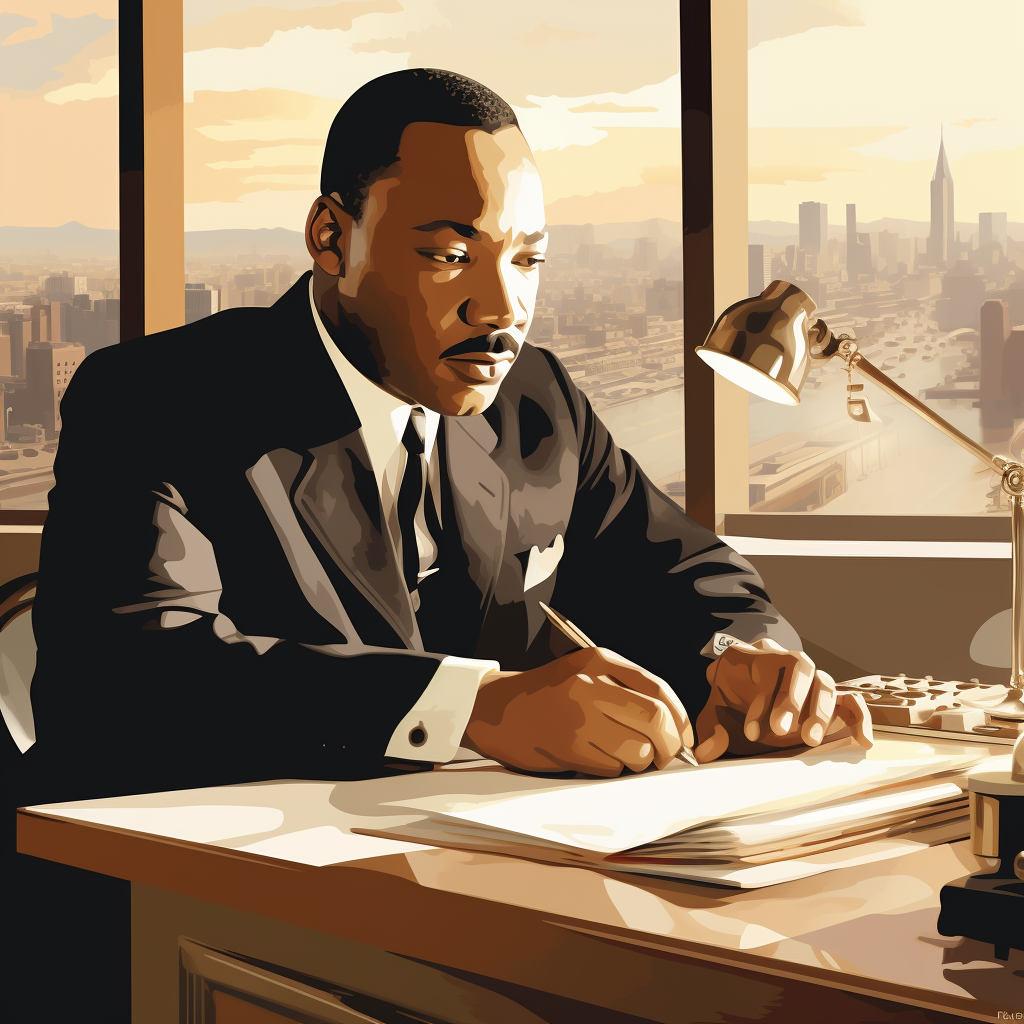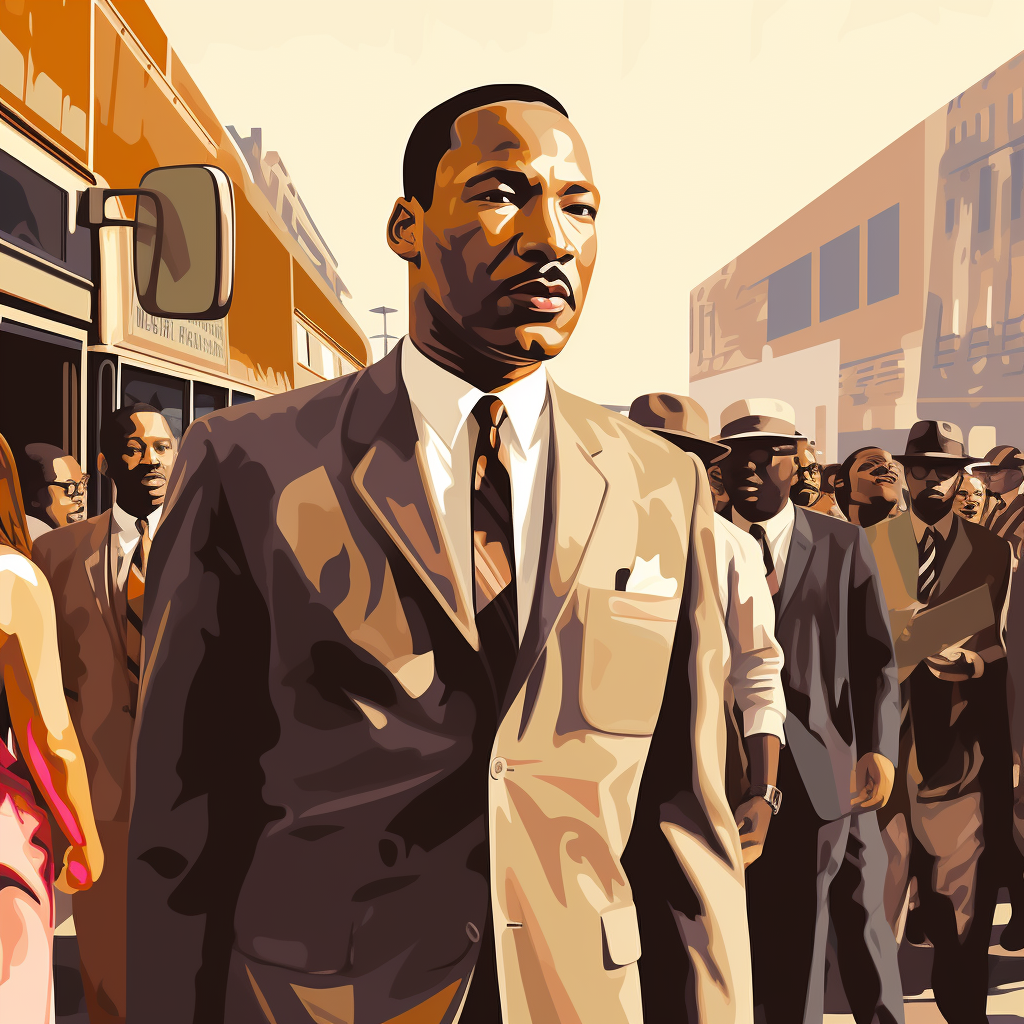PROFILE - Martin Luther King Leadership

Dr. Martin Luther King Jr. continues to stand as an iconic figure in the fight for civil rights, social justice, and martin luther king leadership. His unwavering commitment to nonviolence, his ability to inspire and mobilize people, and his dedication to addressing all facets of social injustice have left a lasting impact on the world.
In this profile post, we will explore the key aspects of King’s martin luther king leadership, his most notable accomplishments, and the lessons that can be drawn from his life and legacy.
Key Takeaways
- Martin Luther King Jr.’s leadership and advocacy for civil rights serves as a powerful example of the power of visionary communication, nonviolent resistance, courage and perseverance in achieving social justice.
- The Letter from Birmingham Jail is an exemplification of his moral leadership and dedication to justice that inspires today’s leaders.
- His legacy provides valuable guidance on nonviolence, reminding us all to pursue a more just society.
The Power of Visionary Communication: "I Have a Dream"

The “I Have a Dream” speech delivered by Martin Luther King Jr. during the March on Washington in 1963 showcased his exceptional oratory skills and ability to articulate a compelling vision for equality.
As a transformational leader, King inspired millions and effectively communicated his message of civil rights and equality for all, fostering a sense of unity and shared purpose among his followers. His speech brilliantly illustrated a world where individuals “will not be judged by the color of their skin but by the content of their character”.
Leaders with the caliber of King recognize how visionary communication is instrumental in accomplishing their objectives. They gauge the situation, anticipate their audience’s needs, and craft impactful speeches that strike a chord with listeners and prompt them to act.
In today’s world, leaders from various fields can learn from King’s example and harness the power of effective communication to inspire and motivate their teams.
The “I Have a Dream” speech also serves as a testament to King’s dedication to nonviolence and his belief in the sacred obligation to fight for justice and equality. Today, as we continue to confront issues of racism and inequality, King’s inspiring words remind us of the importance of standing up for what is right and pursuing a more just and equal society.
Mobilizing Grassroots Movements: Montgomery Bus Boycott

Martin Luther King Jr.’s leadership in the Montgomery Bus Boycott, which began in 1955, highlights his ability to mobilize and inspire grassroots activism for civil rights. As the pastor of Dexter Avenue Baptist Church, King played a crucial role in:
- Organizing and coordinating the boycott
- Advocating for nonviolent resistance
- Delivering compelling speeches that encouraged people to participate and stand up against racial segregation.
King’s role in the Montgomery Bus Boycott showcased his steadfast commitment to his vision of a more equitable and fair society. Despite facing challenges such as resistance from the bus company, local authorities, and even threats of violence, King remained steadfast in his commitment to nonviolent protest and the pursuit of civil rights. This ultimately led to the desegregation of public transportation in Alabama and set a precedent for future civil rights actions.
The Montgomery Bus Boycott offers valuable leadership lessons for today’s business world, emphasizing the importance of grassroots activism, strategic planning, and perseverance in the face of adversity. By mobilizing communities, forming strategic alliances, and pursuing legal action, King was able to overcome the challenges he faced and pave the way for greater social change.
Strategic Nonviolent Resistance: Birmingham Campaign
The Birmingham Campaign in 1963, led by Dr. Martin Luther King Jr., demonstrated his strategic use of nonviolent resistance to combat racial segregation and injustice.
In his “I Have a Dream” speech, King referred to justice rolling down like a mighty stream, reflecting the impact of the Birmingham Campaign. King’s position regarding political activism was one of nonviolence, and he saw it as a sacred obligation to fight for justice and equality.
To effect change, King maintained that disrupting the status quo was imperative. His leadership during the Birmingham Campaign involved organizing nonviolent protests, such as sit-ins and marches, which ultimately led to the desegregation of public facilities in the city. By taking the initiative and setting a precedent by modifying an outmoded status quo in their life, individuals can also disrupt the existing conventions in their industries.
The Birmingham Campaign serves as a powerful example of the effectiveness of nonviolent resistance in challenging racial segregation and promoting social justice. King’s leadership and unwavering commitment to nonviolence still inspire current social justice movements, underscoring the enduring impact of his vision and strategies in the struggle for equality.
Moral Leadership and Justice: Letter from Birmingham Jail
King’s 1963 Letter from Birmingham Jail mirrored his profound dedication to justice and his philosophy of nonviolence, serving as an epitome of moral leadership. In the letter, King famously stated that “injustice anywhere is a threat to justice everywhere”. He argued that if one is nonviolent and endures suffering, their adversary will be swayed to alter their mindset.
The Letter from Birmingham Jail also revealed King’s broadened outlook on social justice and his conviction that laws should not be at odds with moral law. He remained steadfast in his pledge to battle for justice, even in the midst of imprisonment. The letter initiated significant dialogues concerning civil rights and nonviolent protest, and served as an exemplification of King’s commitment to justice.
King’s moral leadership and dedication to justice continue to inspire and guide today’s great leaders, including real leaders in various fields. By embracing the qualities of humility, authenticity, and interpersonal acceptance, leaders can emulate his example and make a meaningful impact on society.
Civil Rights Movement: Selma to Montgomery Marches

In 1965, Martin Luther King Jr. led the Selma to Montgomery marches in the face of significant opposition and threats to his safety. The marches were organized to protest the murder of Jimmie Lee Jackson and to surmount obstructions to voting rights for African Americans in Selma. Despite the violence and intimidation encountered along the way, King remained resolute in his commitment to nonviolent protest and the pursuit of justice.
King’s courage and perseverance during the Selma to Montgomery Marches were essential in bringing attention to the civil rights movement and ultimately resulting in the passage of the Voting Rights Act of 1965. His leadership and orations during the marches, inspired by figures like Abraham Lincoln, encouraged and activated thousands of people to join the cause, highlighting the importance of courage and determination in the fight for voting rights.
The Selma to Montgomery Marches serve as a powerful reminder of the importance of courage and perseverance in leadership. Despite the challenges faced, King’s unwavering commitment to his vision and the pursuit of justice led to significant advancements in civil rights and voting rights for African Americans.
Broader Human Rights Advocacy: Opposition to the Vietnam War
Martin Luther King Jr.’s stance against the Vietnam War illustrated his broader commitment to human rights and his willingness to address controversial issues. He spoke out against the war and demanded an end to the bombing of North and South Vietnam, proposing a unilateral truce and a significant transformation of values in the United States. King believed that the war was diverting resources from tackling domestic matters such as racial segregation and inequality.
King’s stance against the Vietnam War aligned with his commitment to human rights, underlining the interrelation of issues like racism, poverty, and war. He viewed the war as a breach of human rights and contended that the resources used for the war should be reallocated to addressing social and economic disparities within the nation. King’s opposition to the war was based on his belief in the intrinsic value and worth of all people, and his dedication to nonviolence and justice for all.
The stance against the Vietnam War demonstrated King’s dedication to human rights and his readiness to confront contentious matters. His resistance to the war highlighted the interconnectedness of issues such as racism, poverty, and war, and his adherence to nonviolence and justice for all. His views on the war were an appeal to action for the United States to concentrate on global justice and tackle urgent domestic issues.
Advocacy for Economic Justice: Poor People's Campaign
King’s focus on economic inequality through the Poor People’s Campaign showcased his dedication to addressing all facets of social injustice. The campaign aimed to:
- Terminate poverty in the United States
- Address economic disparities through nonviolent direct action
- Advocate for economic justice
- Promote labor-intensive economic growth
- Invest in the health and education of the poor
- Focus on poverty, jobs, and job development
King’s role in the Poor People’s Campaign significantly contributed to building a comprehensive, multi-faceted movement that could unify impoverished and impacted communities. He focused on poverty and economic injustice in the months preceding his assassination, organizing a multi-racial movement to dismantle the systems of inequality that engendered conditions of poverty for numerous individuals.
The Poor People’s Campaign had a notable impact on economic justice by advocating for policies that addressed poverty and inequality. It endeavored to:
- Raise awareness about the experiences of people living in poverty
- Highlight the effect of particular policies on their lives
- Persuade the country to take action and combat poverty, not the poor.
International Recognition: Nobel Peace Prize
Martin Luther King Jr.’s receipt of the Nobel Peace Prize in 1964 symbolized international recognition of his nonviolent campaign for civil rights and social justice. The award acknowledged King’s crucial role in organizing the Montgomery Bus Boycott, his leadership in the Birmingham Campaign, and his dedication to nonviolent resistance and civil rights. His designation as a Nobel laureate further reinforced his standing as a hero and source of inspiration for those fighting for freedom and dissent around the world.
The international community responded to MLK’s receipt of the Nobel Peace Prize with great enthusiasm and approval. People from various countries and regions expressed their joy and admiration for his accomplishment. MLK’s award brought the modern American Civil Rights Movement to international attention, further elevating the importance of his work in promoting peace and justice.
King utilized the platform provided by the Nobel Peace Prize to further his advocacy for social justice by:
- Donating the prize money, valued at $54,600, to the civil rights movement
- Bringing the modern American Civil Rights Movement to international attention
- Emphasizing the importance of his nonviolent campaign for civil rights and social justice
Transformational Leader: "I've Been to the Mountaintop"

One of King’s final speeches, “I’ve Been to the Mountaintop,” delivered on April 3, 1968, reflected his resilience and foresight, in the face of threats to his life. The historical context of this speech was King’s support for the Memphis sanitation workers and their strike for better conditions. The speech is widely regarded as one of his most prophetic, as he was assassinated just 32 hours later.
The primary themes of the “I’ve Been to the Mountaintop” speech are unity, Christianity, and selflessness. King’s resilience in the face of adversity and his foresight in anticipating the challenges that lay ahead for the civil rights movement are a testament to his exceptional leadership qualities. His determination to fight for justice, even in the most difficult circumstances, serves as an inspiration for leaders around the world, including those within the southern christian leadership conference.
King’s “I’ve Been to the Mountaintop” speech also exemplifies his transformational and servant leadership. His willingness to put the needs of others before his own and his unwavering dedication to the cause of civil rights demonstrate the qualities of a great leader. Associate Professor Neck and Godwin’s paper on King’s leadership techniques highlights the importance of these strategies in modern enterprises.
Legacy and Ongoing Influence

The ongoing influence of Martin Luther King Jr.’s leadership on contemporary social justice movements and the enduring relevance of his vision demonstrate his lasting impact. His unwavering commitment to nonviolence, his ability to inspire and mobilize people, and his dedication to addressing all facets of social injustice have left a lasting impact on the world. King’s legacy continues to provide direction to activists in various fields, including environmental justice.
The “I Have a Dream” speech offers eight insights into the qualities of an exemplary leader. These insights, along with the lessons learned from King’s life and accomplishments, serve as valuable guidance for leaders in today’s world. As we continue to confront issues of racism and inequality, King’s inspiring words and actions remind us of the importance of standing up for what is right and pursuing a more just and equal society.
Summing up, the leadership, vision, and dedication to justice of Martin Luther King Jr. have left an unerasable imprint on history. His life and legacy serve as a constant reminder of the power of nonviolence, the importance of visionary communication, and the necessity of courage and perseverance in the face of adversity. As we strive for a better, more just world, let us remember and honor the life and work of one of history’s greatest leaders.
Summary
In this blog post, we have explored the key aspects of Martin Luther King Jr.’s leadership, his most notable accomplishments, and the lessons that can be drawn from his life and legacy. From his powerful “I Have a Dream” speech to the courage and perseverance displayed during the Selma marches, King’s leadership has left a lasting impact on civil rights, social justice, and the world as a whole. May his inspiring vision and unwavering commitment to justice continue to guide us in our pursuit of a more just and equal society.
Frequently Asked Questions
What is Martin Luther King's leadership style?
Martin Luther King, Jr. exhibited a transformative leadership style, characterized by charisma, interdependence on other leaders, commitment, and the capacity to turn challenges into greatness. He used this brand of authentic leadership to fight for civil rights and bring joy, hope, and a positive attitude to people through his vision, message, and rhetorical speech.
What is Martin Luther's leadership?
Martin Luther King Jr. demonstrated exemplary transformative leadership qualities, using his vision and powerful rhetoric to fight for civil rights and equality for all Americans. His example shows how ordinary people can have an impact and serves as a reminder that everyone has the potential to be part of positive change.
What made Martin Luther King became a leader?
Dr. King's nonviolent approach to achieving equal rights for Black Americans, his inspirational speeches, and unwavering commitment to his vision despite opposition, made him a natural leader and earned him the Nobel Peace Prize in 1964.
What makes Martin Luther King a servant leader?
Martin Luther King was a servant leader, devoted to the well-being of others and respectful of their dignity. He led with empathy and shared experiences, creating a caring atmosphere for those he served.
What was the main message of Martin Luther King Jr.'s "I Have a Dream" speech?
Martin Luther King Jr.'s "I Have a Dream" speech powerfully advocated for civil rights and equality, galvanizing millions to stand up against racial segregation and injustice.



